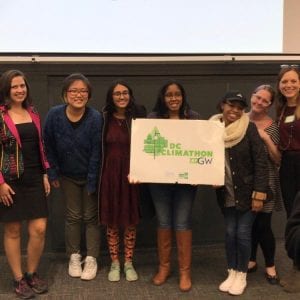Thanksgiving is coming up; how do I make sure that mine is green?
Lucy Hummer
I sit here writing this post on my last day in the office before the short holiday break. Thanksgiving is just two days away, and so is all of the food and family that comes along with it. Whether or not you stand behind the cultural message and tradition of the holiday, you likely still sit and break bread with relatives back in your hometown. Just like Halloween, this serves as an opportunity to spread sustainable practice to those around you!
Last year I made a vegan casserole for my family and literally no one ate it. While this was a bummer, I found it kind of funny and I ultimately used it to learn a bit of a lesson. First, the idea that Thanksgiving is so rooted in tradition makes it harder to break the ties regarding the types of food that you should eat that day. A whole roasted bird, I am sorry to tell you, is not necessarily the most sustainable choice you can make. The thought of having this day without a turkey, however, can sound completely ridiculous. A lot of the “fun” surrounds getting up early, checking on the oven every hour and somehow being surprised by how long a twenty-pound animal takes to cook. Second, I think that if I didn’t tell my family that it was vegan, they would have tried it. For people that have no experience with or exposure to animal product-free dishes, there is certainly a stigma regarding the flavor/texture/appearance of the food. What I made was really good, if I do say so myself. Their loss!
I am simply speaking from my own experience, and I am sure that there are more open-minded families out there when it comes to trying less traditional Thanksgiving choices. It does not have to be a huge ordeal to be more sustainable! There are some dishes such as gravy or biscuits that can be made without dairy and no one would even be able to tell. But, is vegan synonymous with sustainable? Not necessarily. It IS possible to have meat and dairy products at your table without feeling guilty. If you go for farmers who responsibly raise their animals, you can (usually expensively) find a turkey with a minimal impact on the Earth. It’s super easy to make so many yummy foods that you don’t even miss a turkey, though! And everybody agrees that turkey really isn’t that great anyway, right?
Plus, there are other indicators of sustainability beyond the list of ingredients. Choosing items that are locally grown makes a huge difference. Much of the impact that food has on our environment comes from the shipping and trucking that comes with buying from around the globe. If you buy a good that comes from right outside your city, this massively reduces its footprint. It also always feels really great to know that you are supporting local farmers.
This goes hand in hand with the concept of buying in-season as well. The US grocery marketplace has created the expectation that we should be able to purchase all types of food all throughout the year. If you think about it for just a second, though, does this really make any sense? Strawberries can only be grown for a few months a year, so how come you can buy them all year long? Advanced refrigeration, storing and preserving techniques make the supermarket look fully stocked and colorful at all times. For the best taste and minimum waste of time, energy and food, choose fruits and veggies that are actually harvested in November. (If you’re wondering, this is produce like apples, squash, root vegetables, etc).
Ultimately, the idea of reducing animal products and choosing ingredients that are local and in-season may seem pretty common sense. That being said, why don’t more people actually do it? A lot of families have done their Thanksgiving day in the same way for years. Changing this may seem unappealing, but think of the impact Americans could make via this one minor cultural tradition. According to Google, almost fifty million turkeys are eaten on this day alone each year. If eliminating the bird seems like too far of a stretch, small changes are positive, too! Think of one or two dishes that you could alter just slightly to make them more sustainable. That sounds like a win to me.


